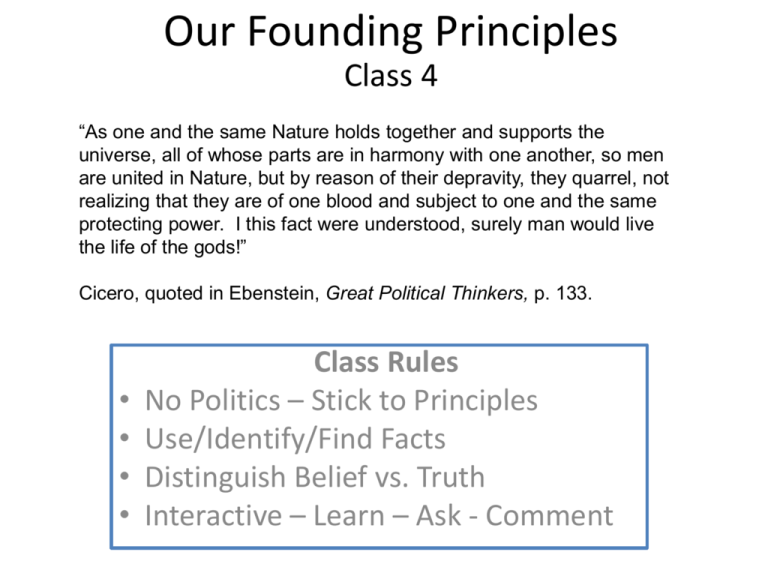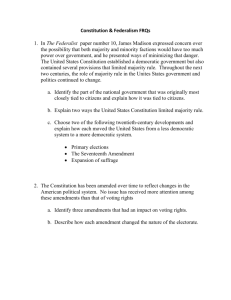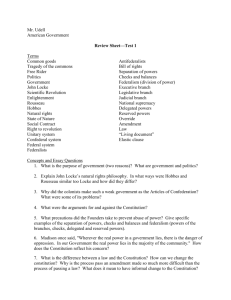Telos1C4 - freedom101
advertisement

Our Founding Principles Class 4 “As one and the same Nature holds together and supports the universe, all of whose parts are in harmony with one another, so men are united in Nature, but by reason of their depravity, they quarrel, not realizing that they are of one blood and subject to one and the same protecting power. I this fact were understood, surely man would live the life of the gods!” Cicero, quoted in Ebenstein, Great Political Thinkers, p. 133. • • • • Class Rules No Politics – Stick to Principles Use/Identify/Find Facts Distinguish Belief vs. Truth Interactive – Learn – Ask - Comment Class 4 Agenda Review www.freedom101.us site wrt Class Posts Finish Natural Law Presentation - Quotes Finish Democracy vs. Republic Discussion Break Federalism – What it is Federalism – How it is Implemented Federalism – Founders Quotes PowerPoint posted at: www.freedom101.us/category/TELOS1/ Natural Law • What it is • How it was implemented • Definition & Quotes re Natural Law Dictionary Definitions of NL Cicero, 106 – 43 B.C., studied law in Rome and philosophy in Athens, became a lawyer then a member of the Roman Consul and was assassinated by Anthony. “True Law (which he had defined as Natural Law) is right reason in agreement with nature: it is of universal application, unchanging and ever lasting; it summons to duty by its commands, and averts from wrongdoing by its prohibitions. It is a sin to try to alter this law, nor is it allowable to repeal any part of it, and it is impossible to abolish it entirely. We cannot be freed from its obligations by senate or people, and we need not look outside ourselves for an expounder or interpreter of it. And there will not be different laws at Rome and at Athens, or different laws now and in the future, but one eternal and unchangeable law will be valid for all nations and all times, and there will be but one master and ruler, that is God, over us all, for he is the author of this law, its promulgator, and its enforcing judge. Whoever is disobedient is fleeing from himself and denying his human nature, and by reason of this very fact he will suffer the worst punishment.” Natural Law & our Constitution • • Unalienable rights including: – Right to self government, – Right to bear arms, – Right to own, develop and dispose of property, – The right to assemble, – The right to petition, – The right of free speech & press – The right to enjoy the fruits of one’s labors, – The right to contrive and invent, – The right to privacy, – The right to provide personal security, – The right to a fair trial, – The right of free association, – The right to contract. Unalienable Duties, including: – To not take the life of another except in self-defense, – To not steal or destroy the property of another, – To be honest in all transactions with others, – For parents and to protect, teach, feed, clothe & shelter children, – To support law and order and keep the peace, – To help the helpless, – To maintain the integrity of the family structure, – To perpetuate humanity, – To not promote or participate in the vices which destroy personal and community life, – To follow rules of moral rectitude. • • • • • Habeas corpus Limited government Separation of powers Checks and balances Justice by reparation or paying of damages • No Taxation without Representation • Justice System 0% Freedom Autocratic Democratic Republic Anarchy Natural Law Government Citizens Majority Citizens Government Minority Citizens Citizens F. Constitution F. Government S. Constitution S. Government L. Government Citizens 100% 0% Freedom Autocratic Democratic Republic Anarchy Natural Law Government Citizens Majority Citizens Government Minority Citizens Citizens F. Constitution F. Government S. Constitution S. Government L. Government Citizens 100% 0% Freedom Autocratic Anarchy Democratic Votes Majority Citizens Tax Law Government Minority Citizens $ 100% 0% Freedom Autocratic Democratic Republic Anarchy Natural Law Government Citizens Majority Citizens Government Minority Citizens Citizens F. Constitution F. Government S. Constitution S. Government L. Government Citizens 100% 0% Freedom Autocratic Democratic Republic Anarchy Natural Law Government Citizens Majority Citizens Government Minority Citizens Citizens F. Constitution F. Government S. Constitution S. Government L. Government Citizens 100% 0% Freedom Autocratic Government Citizens Democratic Republic Majority Citizens Government Minority Citizens Citizens F. Constitution F. Government S. Constitution S. Government L. Government Anarchy Citizens 100% 0% Freedom Autocratic Democratic Republic Anarchy Natural Law Government Citizens Majority Citizens Government Minority Citizens Citizens F. Constitution F. Government Citizens 100% 0% Freedom Autocratic Democratic Republic Anarchy Natural Law Government Citizens Majority Citizens Government Minority Citizens Citizens F. Constitution F. Government S. Constitution S. Government L. Government Citizens 100% Natural Law & Our Constitution • • Unalienable rights that flow from Natural Law, to be protected by the Local, State & Federal Government: – Right to self government, – Right to bear arms, – Right to own, develop and dispose of property, – The right to assemble, – The right to petition, – The right of free speech & press – The right to enjoy the fruits of one’s labors, – The right to contrive and invent, – The right to privacy, – The right to provide personal security, – The right to a fair trial, – The right of free association, – The right to contract. Unalienable Duties that flow from Natural Law of the Citizens, Local Government and State including: – To not take the life of another except in self-defense (+Fed), – To not steal or destroy the property of another (+Fed), – To be honest in all transactions with others (+Fed), – For parents and to protect, teach, feed, clothe & shelter children, – To support law and order and keep the peace, – To help the helpless, – To maintain the integrity of the family structure, – To perpetuate humanity, – To not promote or participate in the vices which destroy personal and community life, – To follow rules of moral rectitude. Features Founders Instituted to Implement Natural Law • System of Justice • Separation of powers, Horizontal and Vertical • Limited government • Checks and balances • Written Constitution Legal Dictionary Definition of Federalism A principle of government that defines the relationship between the central government at the national level and its constituent units at the regional, state, or local levels. Under this principle of government, power and authority is allocated between the national and local governmental units, such that each unit is delegated a sphere of power and authority only it can exercise, while other powers must be shared. Legal Dictionary Definition of Federalism, Continued The term federalism is derived from the Latin root foedus, which means "formal agreement or covenant." It includes the interrelationships between the states as well as between the states and the federal government. Governance in the United States takes place at various levels and branches of government, which all take part in the decision-making process. From the U.S. Supreme Court to the smallest local government, a distribution of power allows all the entities of the system to work separately while still working together as a nation. Supreme Court justice HUGO L. BLACK wrote that federalism meant a proper respect for state functions, a recognition of the fact that the entire country is made up of a Union of separate State governments, and a continuance of the belief that the National Government will fare best if the States and their institutions are left free to perform their separate functions in their separate ways. (Younger v. Harris, 401 U.S. 37, 91S. Ct. 746, 27 L. Ed. 2d 669 [1971]) The Constitution lists the legislative powers of the federal government. The Tenth Amendment protects the residual powers of the states: "The powers not delegated to the United States by the Constitution, nor prohibited by it to the States, are reserved to the States respectively, or to the people." How Federalism is Implemented by the Constitution • Enumerate the Powers of the Federal Government (Article 1, Section 8) • Explicitly state that all other powers are delegated to the States and to the people (9 & 10 Amendments) • Have Senators elected by State Legislators (Article 1, Section3, reversed by Amendment 17) Powers of Congress The Constitution enumerates the powers of Congress, hence the Federal Government, and these powers are: • Tax and borrow money for the Defense and General Welfare of the United States. • Regulate Commerce with Foreign Countries, between States and with Indian Tribes. • Control Immigration and Bankruptcy Law. • Coin Money and punish counterfeiting. • Set up Post Offices and Post Roads. • Establish Copyright, Patent, and Trademark Law. • Declare War, maintain an Army and Navy and put down rebellions. Congress also has the power to make all laws “Necessary and Proper” to carry out these powers. What Our Founders Had to Say About Federalism Separation of Powers by Level of Gov Constitution Federal Gov. State Gov. Local Gov. Churches Charities Citizens Other Org. Citizens Separation of Powers by Level of Gov Constitution Federal Gov. State Gov. Local Gov. Churches Charities Citizens Other Org. Citizens Life, Liberty and ………???? • The first draft of the Declaration of Independence listed the unalienable rights as Life, Liberty and Property. • They changed Property to “pursuit of happiness” in because the south considered slaves to be property. • They considered “pursuit of happiness” and property to be synonymous. • Their idea of property was more than money, it included family, religion, ideas, hopes, or in short, the “fruits of one’s labor”. Founders & Democracy II • John Quincy Adams: “The experience of all former ages had shown that of all human governments, democracy was the most unstable, fluctuating and short-lived.” • Benjamin Franklin: “Democracy is two wolves and a lamb voting on what to have for lunch. Liberty is a well armed lamb contesting the vote.” • James Madison: “Democracy was the right of the people to choose their own tyrant.” • There are many more – go to http://takeourcountrybacksnooper.blogspot.com/2008/12/democracy-v-republic-founding-fathers.html







